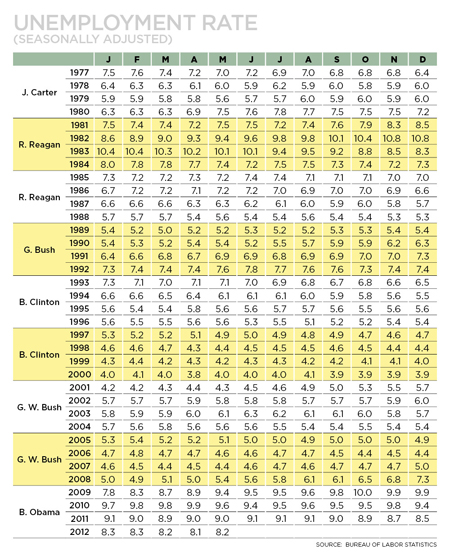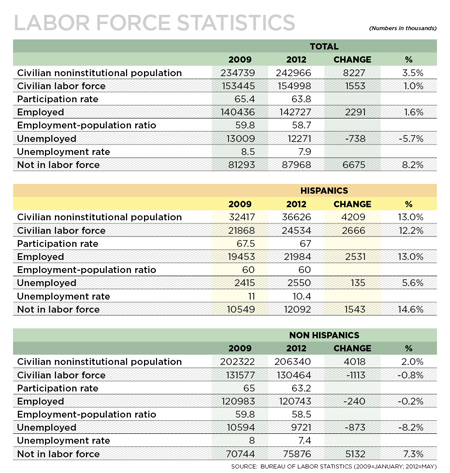
The publishing of the employment statistics for May by the Bureau of Labor Statistics was without doubt a big blow to President Barack Obama's reelection ambitions, to the extent that many consider that the suspension of deportations of dreamers is a measure calculated to focus attention on issues other than the economy. At five months short of the election, an increase -- even if it's of only a tenth of a perceptual point -- in the unemployment rate isn't good news for Obama's followers. Especially when polls show that November's election could be a closer run than many thought it would be several months ago.
As expected, the Republican politicians, standing by the now official candidate Mitt Romney, jumped in joy at the Bureau of Labor Statistics numbers, and wasted no time to launch yet another campaign against Obama and his economic policies, taking advantage of the President's mistake of stating, without clarifying -- as clearly evident in the automobile industry and in several more --, that the country's private sector is doing well, when the truth is that many sectors continue having economic problems, as he had to admit several hours later. But it's possible that we need to give this a second look.
Americans usually punish presidents at the voting booths because they have not lowered the unemployment rates during the last government year. During the last 12 months of Jimmy Carter's administration unemployment grew from 5.9% to 7.5%, and during George Bush senior's administration it climbed from 7 to 7.4%. Both lost the reelection. During Bill Clinton's first administration -- It's the economy, stupid! -- the rate stayed almost the same during the last year, decreasing from 5.6 to 5.4%, and ended 2 points below the one existing when his administration began. In George W. Bush's case, the rate ended in 5.4, a little more than one point above its initial value, but more than half a point below that present when his last year began. Both were reelected.

In statistical terms -- solely statistical, so that I am not misunderstood -- Obama's case looks more like Ronald Reagan's. Reagan began his administration with an unemployment rate of 7.5%, but the recession generated by his anti inflationary policies -- designed to combat an inherited situation -- forced it to climb to 10.8% in November of 1982 (and stayed above 10% for nearly a year). Towards the end he managed to lower the unemployment rate to 7.2%, a level similar to that at the beginning of his mandate. Obama inherited an unemployment rate of 7.8% and an economy facing the risk of going into a deep recession. In October of 2009 the unemployment rate reached the 10% level -- for the first time since the Reagan era -- and today it's at 8.2%.
Of course, I acknowledge that this analysis -- based in the Bureau of Labor Statistics data -- is simplistic. But not less simplistic are the messages launched by the Republicans after the publication of the latest unemployment statistics. And considering that employment data is not easy to comprehend, it's relatively easy to misguide the voters, which is just what they have been trying to do, for example, in the case of the Hispanics. According to an ad published by candidate Mitt Romney, "Under president Obama, more Hispanics have struggled to find work that at any other time on record". Also, both he and his followers don't get tired of repeating that the unemployment rate amongst Hispanics jumped from 10% in January 2009 to 11% in May of this year.
Both statements are correct, but they do not tell the entire story. Although it's true that "under president Obama, more Hispanics have struggled to find work that at any other time on record", it's not because his administration has decided to discriminate against the Hispanics, but because Hispanics have been the population group in the work force that has grown the most -- together with the Asian -- during the last 4 years. And this generates a big impact on the workforce statistics.
Between January 2009 and May 2012 the Hispanic work force grew in more than 4 million people (representing more than half the total growth of the country's workforce, according to the Bureau of Labor Statistics data). That is why there have been more Hispanics that have never looked for a job. What Romney's ad doesn't say is that most of them found employment. During that time lapse the Hispanic work force (people active in the labor market) grew by 2,666,000 people. And the amount of employed Hispanics grew by 2,531,000. Not all of them found jobs, that is true, and that is why the unemployment numbers also grew. Today we have 13% more Hispanics working than 4 years ago, while the rest of the ethnic groups haven't added one additional worker to the labor statistics.

This does not mean that the unemployment rate is not greater among Hispanics, because labor statistics, to some politicians' advantage, allow the two issues to be present simultaneously: that we have more people employed and at the same time that the unemployment level rises. But all this is not new. Historically the unemployment rate amongst Hispanics has been greater than the national average. In January 2009, the country's unemployment rate was 7.8% and the Hispanic unemployment was 10%. With the recession, the first rose to 10% and the Hispanic reached a peak of 13% -- thanks to the downfall of sectors such as construction. Today both are far below those levels. And that's the curve that the Republican ads ignore.
It's true that we still have a long way to go in order to bring the labor market to the levels present before the crisis. And it's good that the President recognizes it, instead of minimizing the weight that the economy will have -- and always has -- in the next elections. It's not esasy to climb out of such a deep hole as that faced by Barack Obama at the beginning of his administration. But now we can see the light again, and that is, I believe, what the President must emphasize to obtain the reelection. I agree with many analysts that the president has failed to sell his achievements well.